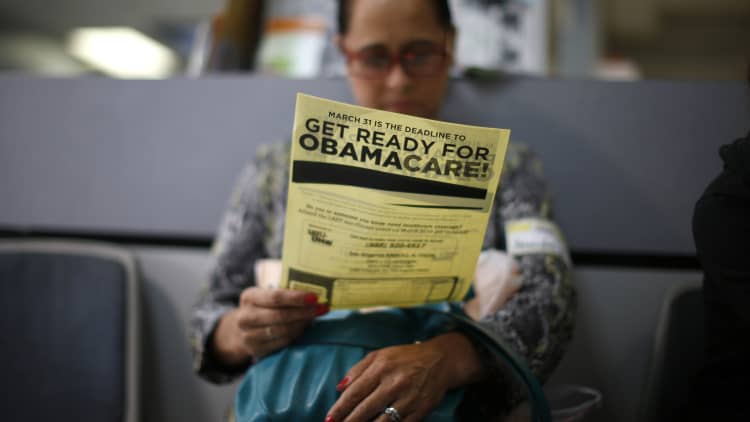
The Trump administration and Republicans in Congress face a tough balancing act when it comes to repealing Obamacare.
They have to make sure they don't upend the Affordable Care Act too quickly, so that they don't cause the exchange market to collapse. At the same time, they can't delay a replacement plan for too long.
"Insurers have only a matter of weeks before they have to file rates and plans for participation in 2018," said Sabrina Corlette, a research professor at Georgetown University's Center on Health Insurance Reforms.
"The longer there's uncertainty, the longer (insurers) don't know what the rules of the road are, the more they're going to have to adjust for that uncertainty," she said.
"When you think about the 20 million people who are covered (under Obamacare) you're going to have to have a bridge from what they have to today to what they will have in the future," former Aetna CEO Ron Williams told CNBC. "Without that you really have no way to accommodate the infrastructure of the program or even the amount of work to be done."
Clocking ticking on 2018
The timeline to build a bridge for repealing and replacing Obamacare will be tight. Insurers will be preparing 2018 plan rates over the next couple of months, ahead of a May deadline to submit 2018 rate requests for approval.
Analysts say a repeal measure passed through budget reconciliation process would need to be resolved within the next month. The measure will have to give insurers a roadmap for how long Obamacare subsidies will remain in place and a timeline for the transition to a replacement plan.
"It has to be made clear to insurance companies that there's a process in place for repeal and replace — or repeal and delay — but none of that is going to impact the 2018 market," said Deep Banerjee, an S&P director and health-care credit ratings analyst. "If that certainty is not provided to the insurance companies then suddenly what happens is that they have to price in uncertainty."
If legislation on a replacement plan is delayed, analysts say the administration and Congress need to make real progress on the new reforms over the summer, so that there's some clarity by the time the Trump administration approves final 2018 rates in August.
Without clear guidelines, insurers may be reticent to sign on for another year in the individual market. They don't have to commit to 2018 plans until September, just a few weeks before the start of 2018 open enrollment.
"Some of them might be reluctant to do that if they don't know what the rules of the road are long term. A lot of them have been losing money but have been willing to stick it out in the hopes [of] profitability down the line," said Corlette.
Two-year horizon
The Republicans need to enact a replacement plan by the end of this year to ensure a clear transition, said S&P's Banerjee. Yet, even then, it will take years to get past Obamacare.
"We think once a replacement plan is signed into law, insurance companies will need two to four years to implement it ... depending on the complexity," Banerjee said.
After experiencing big losses on Obamacare over the last couple of years, insurers will likely be cautious about jumping onto the next wave of health reform.
"I think they believe they made a mistake the first time, at least the ones who decided to enter into a market that was a little bit volatile," Banerjee said. "They're not going to take that risk again, most likely."
Even with a Republican majority and president, getting a consensus to repeal and replace Obamacare with a whole new set of reforms is easier said than done.
"I think what we're going to see is a repeal with a long lead time, and then a lot of debate to try to find a program that's market-based, and a program that is financially sustainable — both from a patient point of view but also from a taxpayer point of view," Williams said.


